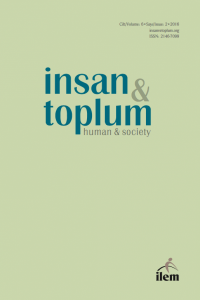Abstract
When it comes to Turkey’s experience, the reasons for using West and modernity together are the secularisation policies of Republican Turkey and its reform goals, which take the West as their example in every sense. Besides these political reflections, literary and artistic changes were also part of the political aims and reforms. In this regard, all literature having an Islamic core was abandoned as “Ottoman” and therefore irrelevant. This inevitably led to works of “modern literature” being interpreted as against the former one. Thus, considering the fact that both modern forms (e.g., novels) and traditional Islamic literary forms shape literature with an Islamic core today, a certain issue has arisen: Where should the new forms be located in the conceptual discussion. Consequently, how does one “name” those works created in traditional or modern forms and having Islam as their subject? To determine the place of literary works having an Islamic subject in literary history, this article highlights that Islam is in a relationship with the new forms and that this relationship is both healthy and deserves to be examined. It also seeks to draw the attention of Islamic literature researchers to the continuing Islamic literary tradition that after the 20th century, a new naming is proposed for the cited period. In this way, the field referred to by the Islamic literary tradition as being developed with new content and forms is clarified, and the existence of a literary tradition that is more inclusive than the others developed in previous naming trials is highlighted.
Keywords
Islamic novel Turkish Islamic Literature Islamic Literature Islamist Literature Modern Literary Forms.
References
- Kahraman, M. (1996). Divan edebiyatı üzerine tartışmalar. İstanbul: Beyan Yayınları.
- Kemikli, B. (2012). Türk İslâm edebiyatının tanımı ve mahiyetine dair bazı mülahazalar. In Y. Yaman (Ed.), I. İslâmî Türk Edebiyatı Sempozyum kitabı (pp. 25-17). İstanbul: Sütun Yayınları.
- Kemikli, B. (2014). Türk İslâm edebiyatı: Giriş. Bursa: Emin Yayınları.
- Köprülü, M. F. (1981). Türk edebiyatı tarihi. İstanbul: Ötüken Yayınları.
- Levend, A. S. (1962). Ümmet çağı Türk edebiyatı. Ankara: Türk Tarih Kurumu.
- Okay, O. (2012). “İslami Edebiyat Kavramı.” In Y. Yaman (Ed.), I. İslâmî Türk Edebiyatı Sempozyum kitabı (pp. 13-11). İstanbul: Sütun Yayınları.
- Öztekin, N. (1993). İslâmî Türk edebiyatına giriş ve metin şerhi. İzmir: Ege Üniversitesi.
- Pekolcay, N. (2002). İslâmî Türk edebiyatı. İstanbul: Kitabevi Yayınları.
- Seyhan, E. (2005). Gülzar-ı tasavvuf. Bursa: Uludağ Yayınları.
- Şener, H. İ. and Yıldız, A. (2003). Türk İslâm edebiyatı. İstanbul: Rağbet Yayınları.
- Şenler, Ş. Y. (2013). Huzur Sokağı. İstanbul: Timaş Yayınları.
- Tanrıkorur, Ç. (1998). Musiki kimliğimiz üzerine düşünceler. İstanbul: Ötüken Neşriyat.
- Türk Dil Kurumu. (2016). Büyük Türkçe sözlük. Retrieved from: http://www.tdk.gov.tr/index.php?option=com_ bts&arama=kelime&guid=TDK.GTS.559257cea2aac9.34245226 at November 12th, 2016.
- Turhal, Ş. K. (1989). Müslüman Kadının Adı Var. İstanbul: Seha Neşriyat.
- Turhan, M. (2010). Kültür değişmeleri: Sosyal psikoloji bakımından bir tetkik. İstanbul: Çamlıca Yayınları.
- Üstüner, K. (2007). Divan şiirinde tasavvuf: 14.ve 15.yüzyıl divanlarına göre. Ankara: Birleşik Yayınevi.
- Yalçın, Y. (Ed.). (2012). İslami Türk Edebiyatı Sempozyumu Kitabı. İstanbul: Sütun Yayınları.
- Yılmaz, A. (Ed.). (2012). Türk İslâm edebiyatı: El kitabı. Ankara: Grafiker Yayınları.
Details
| Primary Language | English |
|---|---|
| Subjects | Creative Arts and Writing, Religious Studies |
| Journal Section | Research Articles |
| Authors | |
| Publication Date | December 15, 2016 |
| Published in Issue | Year 2016 Volume: 6 Issue: 2 |


